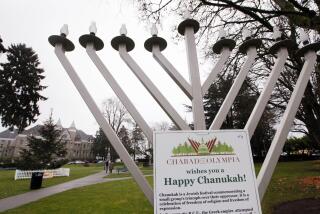Judge hears arguments in rabbi’s contempt case
- Share via
As U.S. District Judge Margaret Morrow contemplated federal law from her bench Wednesday, more than a dozen ultra-Orthodox Jewish men watched. One held open a gilt-edged, elaborately embossed copy of the Shulchan Aruch, a book of Jewish law, tracing lines of the Hebrew text with his finger.
Appearing before the judge was Rabbi Moshe Zigelman, 64, a devout Hasid who was refusing to testify before a federal grand jury, citing an ancient Jewish principle that forbids informing on other Jews.
Zigelman was ordered to testify in a tax-evasion case involving his Brooklyn, N.Y.-based Hasidic sect Spinka. He had earlier invoked the same principle, known as mesira, when he pleaded guilty to his part in the scheme in 2008. He was sentenced to two years in prison.
On Wednesday, Morrow heard arguments on whether Zigelman should be found in contempt of court for his refusal and once again be sent behind bars until he testifies. Morrow said she would rule later.
Zigelman’s attorney, Michael Proctor, said sending him back to jail would be futile because of his sincerely held belief in the principle and the consequences of violating it.
Assistant U.S. Atty. Daniel O’Brien said, however, that the religious argument could serve as a “convenient tool” for those who had broken the law. Because there are other Jewish witnesses whose testimony will be vital, allowing Zigelman to avoid testifying has the potential to “stifle” the investigation, he said.
The underlying case is a decade-long scheme in which Spinka and related charities solicited tens of millions in contributions only to funnel 80% to 95% back to donors, allowing tax breaks on the fake donations.
More to Read
Sign up for Essential California
The most important California stories and recommendations in your inbox every morning.
You may occasionally receive promotional content from the Los Angeles Times.














